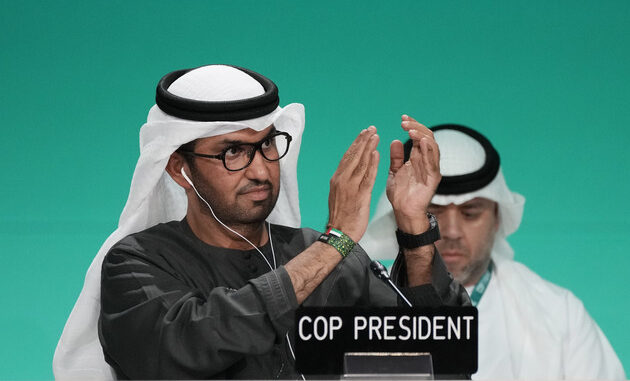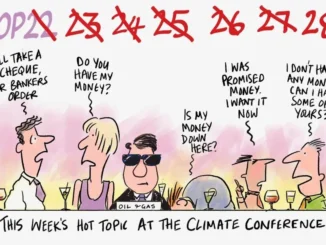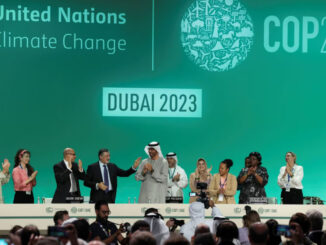
DUBAI, United Arab Emirates — The prospect of a deal to end fossil fuels faded on Monday in the oil-rich United Arab Emirates, when organizers of the U.N. climate summit released a draft proposal that merely suggested reducing them instead.
That outcome would fall far short of the demands that environmental groups, the U.S., the European Union and vulnerable island nations had laid out before the COP28 summit in Dubai, with some activists saying the talks would be a failure if they did not call for phasing out the production of coal, oil and natural gas.
The draft “really doesn’t meet the expectations of this COP in terms of the urgently needed transition to clean sources of energy and the phaseout of fossil fuels,” U.S. climate envoy John Kerry said during a fractious, closed-door meeting late Monday night and early Tuesday, which POLITICO listened to via an unsanctioned feed.
But representatives of other countries, including a bloc that includes China and India, said they would not accept any language proposing either a “phaseout” or “phase-down” of specific energy sources.
Negotiations at the Expo City campus on Dubai’s outskirts were expected to continue through the wee hours on Tuesday — the scheduled final day of the summit.
Earlier that evening, summit president Sultan al-Jaber urged the nearly 200 governments assembled to be flexible and make a deal. The “world is watching” after almost two weeks of discussion, said al-Jaber, who is also the CEO of the United Arab Emirates’ state-owned oil company.
Protesters stood outside chanting: “This text is bullshit.”
Former U.S. Vice President Al Gore unloaded on the proposal, saying in a statement that “COP28 is now on the verge of complete failure.”
“The world desperately needs to phase out fossil fuels as quickly as possible, but this obsequious draft reads as if OPEC dictated it word for word,” Gore said. “It is even worse than many had feared.”
The U.S. State Department said the text needs improvements to “secure a strong outcome” for the summit.
“We appreciate the effort on the part of many to produce the text, which seeks to balance a variety of interests,” department spokesperson Chad Houghton said in a statement. But he said some of the language, “including the issue of fossil fuels, needs to be substantially strengthened.”
The text released Monday included a list of measures that nations would agree to pursue — albeit voluntarily. They included tripling global capacity of renewables by 2030, doubling the rate of energy savings through efficiency measures, “rapidly phasing down unabated coal” and limiting licenses for new power plants. The tripling of renewables was a key goal that the U.S. and China had agreed to in a separate meeting last month.
But most controversially, the text avoided the demands from the EU, U.S. and small island nations to “phase out” fossil fuels. (The U.S., EU, Australia and other industrialized countries specifically targeted “unabated” fossil fuels — those whose greenhouse gas pollution is not captured before entering the atmosphere.) Instead, it suggests that countries commit to “reducing both consumption and production of fossil fuels … so as to achieve net zero by, before, or around 2050.”
Al-Jaber’s proposal was met with dismay by small island nations, the EU and green advocates, who viewed the announcement as a betrayal of their hopes that COP28 would declare unequivocally that fossil fuels must be ended.
“The Republic of the Marshall Islands did not come here to sign our death warrant,” said John Silk, the nation’s minister of natural resources and commerce.
“Overall it is clearly insufficient and not adequate to addressing the problem we’re here to address,” said the EU’s climate commissioner, Wopke Hoekstra.
French Minister for Energy Transition Agnès Pannier-Runacher echoed that sentiment during the closed-door meeting late Monday, saying, “I don’t know what will happens to my kids tomorrow if we stick to this text.”
Others were more sanguine.
Mohamed Adow, the director of the Power Shift Africa think tank, said the deal “lays the ground for transformational change.”
He said it was a compromise between oil powerhouse Saudi Arabia, which opposed any mention of fossil fuels, and the more “progressive” nations. “We will be lucky if we get this adopted.”
Two diplomats from African countries, who were granted anonymity to speak candidly about the sensitive discussions, said that for many countries on their continent the idea of a fossil fuel phaseout was unworkable.
“It was a non-starter,” said one.
Bolivian official Diego Pacheco Balanza, speaking in the closed meeting on behalf of a bloc of countries that includes India, China and more than a dozen other large developing countries, said those nations could “see no space for targeting any sources of energy. Any phaseout or phase-down or prescribing actions of countries is unacceptable to us.”
The talks are officially scheduled to conclude by Tuesday, a few days before a winter festival is due to take over the sprawling, eco-futurist Expo City. But Hoekstra, for one, expressed skepticism that a quick conclusion is in store.
“There is a great majority of countries who actually want and demand more in terms of phasing out, and in terms of what is in the text, and in terms of getting rid of coal, and in terms of making this decade the decade in which we show the most urgency,” he said. “And it is up to us to make sure that these voices are being heard and that this is solved in the next day or next days or however long it takes.”



